人教版英语九年级Unit 1
初中英语人教版9年级unit 1

Eve‘s notes Unit 1 How can we become good learners?→词汇aloud adv. 大声地;出声地pronunciation n. 发音;读音patient adj.有耐心的n.病人expression n.表情;表达方式discover v.发现;发觉secret n.秘密;秘诀pronounce v.发音increase v. 增加;增长ability n. 能力;才能create v.创造active adj. 活跃的;积极的knowledge n.知识→短语ask the teacher for help 向老师求助so...that... 如此......以至于......look up 查阅;抬头看be born with 天生具有pay attention to 注意,关注connect ...with ....把......和.....连接起来→句型--How do you study for a test? 你如何备考?--I study by working with a group. 我通过参加小组学习。
I discovered that listening to something interesting is the secret to language learning. 我发现听有趣的事情是语言学习的秘诀。
What about listening to tapes?→语法:how引导的特殊疑问句及其答语;现在完成时语法专项→现在完成时的用法→难点:watch,look,see与read;try to do sth.与try doing sth.; look for, find与find out要点解析:1.by asking the teacher for help 通过向老师求助【解析】by : 介词,意为“通过,靠”,此处表示方法,手段,其后可接名词,代词或动名词形式。
Unit1单词及词性转换知识点汇总人教版英语九年级全册
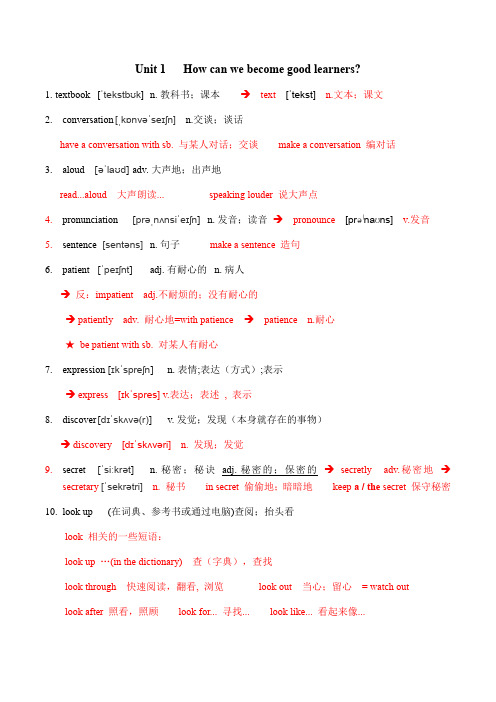
Unit 1 How can we become good learners?1.textbook [ˈtekstbʊk]n.教科书;课本→text [ˈtekst]n.文本;课文2.conversation[ˌkɒnvəˈseɪʃn] n.交谈;谈话have a conversation with sb. 与某人对话;交谈make a conversation 编对话3.aloud [əˈlaʊd]adv.大声地;出声地read...aloud 大声朗读...speaking louder 说大声点4.pronunciation [prəˌnʌnsiˈeɪʃn]n.发音;读音→pronounce [prəˈnaʊns]v.发音5.sentence[sentəns]n.句子make a sentence 造句6.patient[ˈpeɪʃnt]adj.有耐心的n.病人→反:impatient adj.不耐烦的;没有耐心的→ patiently adv. 耐心地=with patience →patience n.耐心★be patient with sb. 对某人有耐心7.expression [ɪkˈspreʃn]n.表情;表达(方式);表示→ express [ɪkˈspres] v.表达;表述, 表示8.discover[dɪˈskʌvə(r)]v.发觉;发现(本身就存在的事物)→discovery [dɪˈskʌvəri] n. 发现;发觉9.secret[ˈsiːkrət]n.秘密;秘诀adj.秘密的;保密的→secretly adv.秘密地→secretary [ˈsekrətri] n. 秘书in secret 偷偷地;暗暗地keep a / the secret 保守秘密10.look up (在词典、参考书或通过电脑)查阅;抬头看look 相关的一些短语:look up …(in the dictionary) 查(字典),查找look through 快速阅读,翻看, 浏览look out 当心;留心= watch outlook after 照看,照顾look for... 寻找... look like... 看起来像...look at... 看... take / have a look (at…) 看一看...look forward to (doing) sth. 期待(做)某事look back on/at 回顾,回忆,回首(往事)11.grammar[ˈɡræmə(r)]n.语法12.repeat[rɪˈpiːt]v.重复;重做13.note [nəʊt]n.笔记;记录v.注意;指出→ notebook n. 笔记本make notes = take notes 记笔记14.pal[pæl]n.朋友;伙伴 a pen pal 笔友15.physics[ˈfɪzɪks]n.物理;物理学→ physical [ˈfɪzɪkl]adj. 身体的;物理学的16.chemistry [ˈkemɪstri] n.化学→chemical [ˈkemɪkl]adj.化学的→ chemist [ˈkemɪst]n. 化学家,药剂师17. memorize ['meməraiz] v. 记忆;记住→memory [ˈmeməri]n.记忆复数: memories18.pattern[ˈpætn]n.模式;方式19.pronounce[prəˈnaʊns] v.发音→ pronunciation[prəˌnʌnsiˈeɪʃn]n.发音;读音20.increase[ɪnˈkriːs]v.增加;增长→反: decrease v. 减少;降低/ reduce v. 减少;缩小★increase by…增加了…increase to….增加到….21.speed[spi:d]n.速度v.加速(speed-sped-sped)speed up 加速at speed 高速,快地at a speed of ... 以....速度22.partner[pa:(r)tnə(r)]n.搭档;同伴→ part n.部分;角色;地区v.分开23.born [ bɔ:n] v.出生adj. 天生的→ birth n.出生give birth to...生育...at birth 在出生时= when sb./sth. was born → birthday n.生日be born in + 年/月be born on + 日期be born with…天生具有…be born + adj. He was born blind.24.be born with 天生具有25.ability[ə’biləti]n.能力;才能★have the ability to do sth. 有做某事的能力→ able adj. 有能力的,能够的→反:unable → disabled adj. 肢体残疾的be able to do sth. 有能力做某事→反:be unable(=not able)to do sth.26.create [kriˈeɪt] v.创造;创建→creation [kriˈeɪʃn]n..创造→ creator n.创造者→ creative [kriˈeɪtɪv] adj.有创造力的→ creativity [ˌkri: eɪˈtɪvəti] n.创造力,创造性27.brain[breɪn]n.大脑brain storm 头脑风暴28.active[ˈæktɪv]adj.活跃的;积极的→ act n. & v. 行为;举动→ actor/actress n.男演员/女演员→ action n. 行动;行为→ activity n. 活动(复数): activities29.attention [əˈtenʃn]n.注意;关注30.pay attention to(to是介词)注意;关注31.connect [kəˈnekt]v.(使)连接;与⋯⋯有联系→ connection n.连接;联系32.connect … with... 把...和...连接或联系起来33.overnight[ˌəʊvəˈnaɪt]adv.一夜之间;在夜间→ night n. 夜;黑夜at night/ in the night在夜里→ tonight adv.在今夜;在今晚→ midnight n. 半夜at midnight 在半夜until midnight 直到半夜34.review[rɪˈvjuː] v. & n.回顾;复习= go over →反:preview v.&n. 预习;预览→view n.看法,意见;视野v. 看待;查看→ interview n.&v. 面试;采访35.knowledge[ˈnɒlɪdʒ][U.]知识;学问→ knowledgeable [ˈnɒlɪdʒəbl] adj. 有知识的;知识渊博的36.lifelong adj.终身的;毕生的37.wisely adv. 明智地;聪明地→ wise adj.明智的→ wisdom n.智慧。
人教版九年级英语Unit1单词、课文_知识梳理_词汇句式精讲
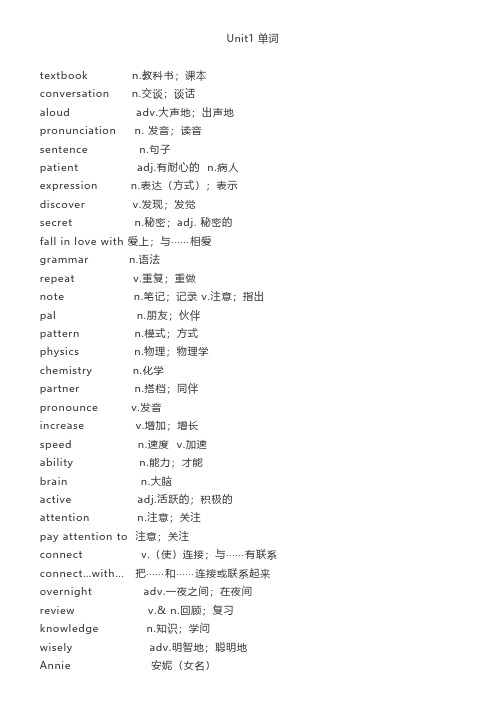
Unit1 单词textbook n.教科书;课本conversation n.交谈;谈话aloud adv.大声地;出声地pronunciation n. 发音;读音sentence n.句子patient adj.有耐心的 n.病人expression n.表达(方式);表示discover v.发现;发觉secret n.秘密;adj. 秘密的fall in love with 爱上;与⋯⋯相爱grammar n.语法repeat v.重复;重做note n.笔记;记录 v.注意;指出pal n.朋友;伙伴pattern n.模式;方式physics n.物理;物理学chemistry n.化学partner n.搭档;同伴pronounce v.发音increase v.增加;增长speed n.速度 v.加速ability n.能力;才能brain n.大脑active adj.活跃的;积极的attention n.注意;关注pay attention to 注意;关注connect v.(使)连接;与⋯⋯有联系connect…with... 把⋯⋯和⋯⋯连接或联系起来overnight adv.一夜之间;在夜间review v.& n.回顾;复习knowledge n.知识;学问wisely adv.明智地;聪明地Annie 安妮(女名)Alexander Graham Bell 格雷厄姆 • 贝尔Unit1 知识梳理Unit 1 How can we become good learners?【重点短语】1. good learners 优秀的学习者2. work with friends 和朋友一起学习3. study for a test 备考4.have conversations with 与……交谈5.speaking skills 口语技巧6.a little 有点儿7.at first 起初 起先8.the secret to... .......的秘诀9.because of 因为10.as well 也11.look up 查阅;抬头看12.so that 以便,为了13.the meaning of ……的意思14.make mistakes 犯错误15.talk to 交谈16.depend on 依靠 依赖17.in common 共有的18.pay attention to 注意 关注19. connect …with …把……联系20.for example 例如21.think about 考虑22.even if 即使 尽管 纵容23.look for 寻找24.worry about 担心 担忧25.make word cards 制作单词卡片26.ask the teacher for help 向老师求助27.read aloud 大声读28.spoken English 英语口语29.give a report 作报告30.word by word 一字一字地31. so……that 如此……以至于32.fall in love with 爱上33.something interesting 有趣的事情34.take notes 记笔记35.how often 多久一次36.a lot of 许多37.the ability to do sth. 做某事的能力38.learning habits 学习习惯39.be interested in 对……感兴趣40.get bored 感到无聊【重点句型】1.提建议的句子:①What/ how about +doing sth.? 做…怎么样?如:What/ How about going shopping?②Why don't you + do sth.? 你为什么不做…?如:Why don't you go shopping?③Why not + do sth. ? 为什么不做…?如:Why not go shopping?④Let's + do sth. 让我们做…吧。
Unit1讲义 人教版英语九年级全册

Unit1 How can we become good learners?1.What about reading aloud to practice pronunciation? What about =How about Why don’t you... Why not... Would you like... Let’s...辨析: aloud,loud与loudlyaloud:(adv)大声地(与call,shout,cry等连用)(adv)出声地(与read等连用)Eg: Please read the text aloud.loud: (adj)大声的(可作定语或表语)Eg: The music is too loud.Please turn it down.(adv)响亮地;高声地(与speak,talk,sing,laugh等连用) Eg:Speak loud,please,or no one will hear you.loudly: (adv)高声地(含有喧闹的意味) (与knock,ring等连用) Eg: Suddenly the bell on the wall rang loudly.注意: ①前缀a(n)表示加强意义eg: aright正确地awake唤醒announce宣布;通告②a与名词或动词结合构成形容词/副词Eg: a+sleep (n.睡眠)=asleep (adj睡着的)a+side(n.边)=aside(adv在旁边)a+head(n.头)=ahead(adv在前面)a+live(v居住)=alive(adj活的)2.Why did Wei Fen find it difficult to learn English?此句的结构的: find it+adj+to do sth. 发现做某事...(其中it为形式宾语,真正的宾语是后面的动词不定式.句中adj为宾补)类似的结构还有:①make it+adj+to do sth. 使做某事...②think it+adj+to do sth. 认为做某事...其他几种“find+宾语+宾补”结构①find+宾语+adj 发现某人或某物Eg: She found the work very dull.②find+宾语+adv (其中副词通常是: in,out,up,down,upstairs等) Eg: I went to her house,but I found her out.③find+宾语+介词短语Eg: When he woke up,he found himself in hospital.④find+宾语+doing sth.Eg:Did you find a woman standing under the tree?⑤find+宾语+(to)do sth.Eg: I found Mary (to) clean the classroom.3.I was afraid to ask questions because of my poor pronunciation.辨析: be afraid to do sth.与be afraid of doing sth.be afraid to do sth. 害怕做某事. 根据经验或常识不敢去做某事,或没有勇气去做某事.Eg: He was afraid to go out at night.be afraid of doing sth. 表示担心会发生某事或某情况(但实际上未必会发生),或不敢做某事(指缺乏勇气或因害怕其后果而不敢)Eg: She was afraid of waking up her husband,for he was ill.4.Although I could not understand everything the characters said,... although (conj) 即使;纵然;虽然相当于though,两者可通用(用来引导让步状语从句,既可以位于主句之前,也可以位于主句之后)辨析: although与though①用作连词,表示“虽然”二者可互换,但although与though 更加正式.在同一个句子中,although与though不能与but连用,但可以与yet 连用.Eg: Although he was tired,he went on working.②Although一般不用作adv,而though可作adv,且一般位于句末,译为:可是;不过.Eg: It’s hard work;I enjoy it,though.③as though(好像;仿佛),even though(即使;纵然)等固定短语中。
人教版九年级英语全册 Unit 1课文原文及翻译
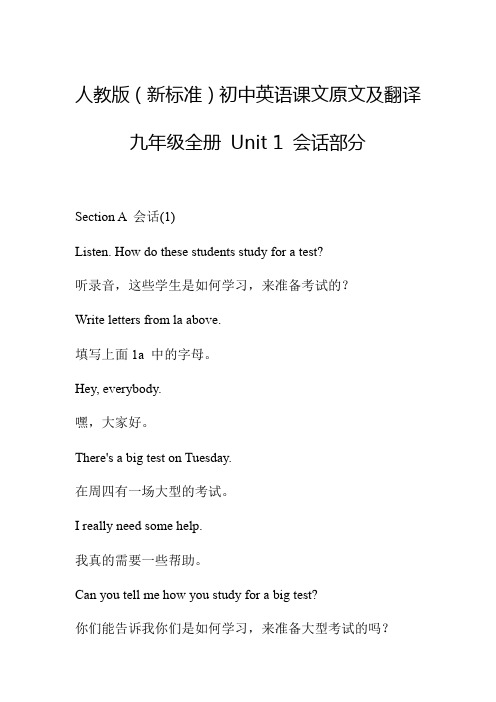
人教版(新标准)初中英语课文原文及翻译九年级全册Unit 1 会话部分Section A 会话(1)Listen. How do these students study for a test?听录音,这些学生是如何学习,来准备考试的?Write letters from la above.填写上面1a 中的字母。
Hey, everybody.嘿,大家好。
There's a big test on Tuesday.在周四有一场大型的考试。
I really need some help.我真的需要一些帮助。
Can you tell me how you study for a big test?你们能告诉我你们是如何学习,来准备大型考试的吗?Sure! Yes. Sure we will.当然!好的,我们当然可以告诉你。
You did really well on the last English test, didn't you, Meiping?上次英语考试,你成绩非常好,是吧,梅萍?Yeah, I did OK.是的,我成绩不错。
Well, how did you study for it?恩,你是如何学习,来准备考试的?By making word cards.通过制作单词卡片。
Maybe I'll try that.或许我可以试试。
So, how do you study for a test, Peter?那么,彼得,你是如何学习,来准备考试的?By asking the teacher for help.通过向老师寻求帮助。
She's always happy to answer my questions.她总是很乐意回答我的问题。
That's interesting.那很有趣。
How do you study, Tony?托尼,你是如何学习的呢?I like to study by listening to tapes.我喜欢通过听录音带来学习。
人教版九年级英语unit1

S: I do that sometimes, I think it helps.
S1: I do, too. And I often look up new words in a
dictionary.
拓展:常见提建议的句子:
T: That’s a good idea.
1. what/how about+doing
她要求我做更多工作。
1b Listen. How do this students study for a test? Write letters from 1a above.
_____b____1. Meiping
_____d_____3. Tony
____e_____2. Peter
1c. Make conversations about how you study for a test.
1. never 从来没有,从不,表示否定 He has never seen such a tall building. 他从未见过这么高的楼。
2. ever 曾经,主要用于疑问句 Have you ever wanted to travel around
the world? 你曾经想要周游世界吗?
a good learner
good grades
good ways to study
……
How do you learn English
By having English class carefully. By taking notes carefully. By finishing homework seriously. By listening to the tapes. By reading English magazines and newspapers. By getting an English tour.
初中英语 Unit1课文及单词表人教版九年级全一册

Unit 1 How can we become good learners? 【Vocabulary】textbook /tekstbuk/ n.教科书;课本p.1conversation /kɔnvəs eɪʃn/, n.交谈;谈话p.2aloud /əlaud/ adv.大声地;出声地p.2pronunciation /prənʌnsieIʃn/ n.发音;读音p.2sentence /sentəns/ n.句子p.2patient /peiʃnt/ adj.有耐心的n.病人p.2expression /ikspreʃn/ n.表达(方式);表示p.3discover /dIskʌvə (r)/ v.发现;发觉p.3secret /si:krət/ n.秘密;adj. 秘密的;p.3look up 查阅;抬头看p.3grammar /græmə (r)/ n.语法p.3repeat /ripi:t/ v.重复;重做p.4note /nəut/ n. 笔记;记录v.注意;指出p.4pal /pæl/ n.朋友;伙伴p.4physics /fiziks/ n.物理;物理学p.4chemistry /kemistri/ n.化学p.4memorize /meməraiz/v.记忆;记住p.4pattern /pætn/, /pætən/ n.模式;方式p.4pronounce /prənauns/ v.发音p.5increase /Inkri:s/ v.增加;增长p.5speed /spi:d/ n.速度v.加速p.5partner /pa:(r)tnə (r)/ n.搭档;同伴p.5born /bɔ:n/ v.出生adj. 天生的p.6be born with 天生具有p.6ability /əbiləti/ n.能力;才能p.6create /krieit/ v.创造;创建p.6brain /brein/ n.大脑p.6active /æktiv/ adj.活跃的;积极的p.6attention /ətenʃn/ n.注意;关注p.6pay attention to 注意;关注p.6connect /kənekt/ v.(使)连接;与⋯⋯有联系p.6connect … with把⋯⋯和⋯⋯连接或联系起来p.6overnight /əuvə (r)nait/adv.一夜之间;在夜间p.6review /rivju:/ v. & n.回顾;复习p.6knowledge /nɔlidʒ/ n.知识;学问p.6lifelong /laiflɔŋ/adj.终生的;毕业的p.6wisely /waizli/ adv.明智地;聪明地p.6【Section A-2d】Jack: Annie, I’m a little nervous. I have to finish reading a book and give a report next Monday.Annie: That doesn’t sound too bad.Jack: But I’m a very slow reader.Annie: Just read quickly to get the main ideas at first. Don’t read word by word. Read word groups.Jack: But I don’t understand many of the words. I have to use a dictionary.Annie: Try to guess a word’s meaning by reading the sentences before and after it. You probably understand more than you think.Jack: That sounds difficult!Annie: Well, be patient. It takes time. You can become better by reading something you enjoy every day. The more you read, the faster you’ll be.【课文翻译】杰克:安妮,我有点紧张,我必须读完一本书,以便下周一作报告。
人教版英语九年级Unit1单元知识点归纳
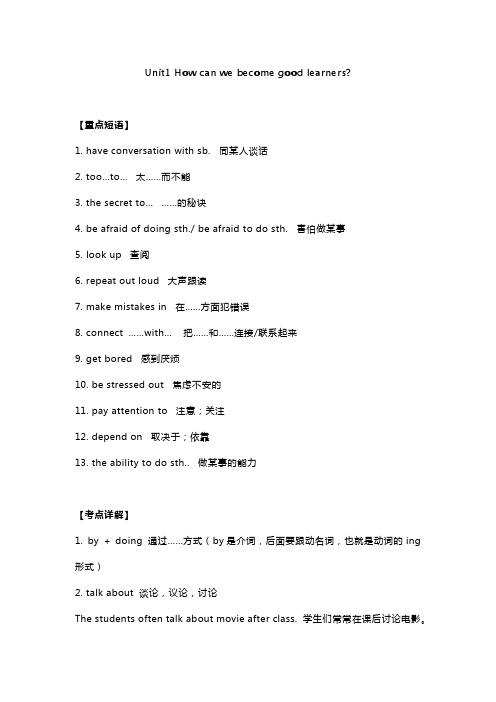
Unit1 How can we become good learners?【重点短语】1. have conversation with sb. 同某人谈话2. too…to…太……而不能3. the secret to………的秘诀4. be afraid of doing sth./ be afraid to do sth. 害怕做某事5. look up 查阅6. repeat out loud 大声跟读7. make mistakes in 在……方面犯错误8. connect ……with…把……和……连接/联系起来9. get bored 感到厌烦10. be stressed out 焦虑不安的11. pay attention to 注意;关注12. depend on 取决于;依靠13. the ability to do sth.. 做某事的能力【考点详解】1. by + doing 通过……方式(by是介词,后面要跟动名词,也就是动词的ing 形式)2. talk about 谈论,议论,讨论The students often talk about movie after class. 学生们常常在课后讨论电影。
talk to sb= talk with sb 与某人说话3. 提建议的句子:①What/ how about +doing sth.? 做…怎么样?(about后面要用动词的ing 形式,这一点考试考的比较多)如:What/ How about going shopping?②Why don't you + do sth.? 你为什么不做…?如:Why don't you go shopping?③Why not + do sth. ? 为什么不做…?如:Why not go shopping?④Let's + do sth. 让我们做…...吧。
人教版九年级英语 Unit1 词汇,句型,语法和练习(附:作文两篇)
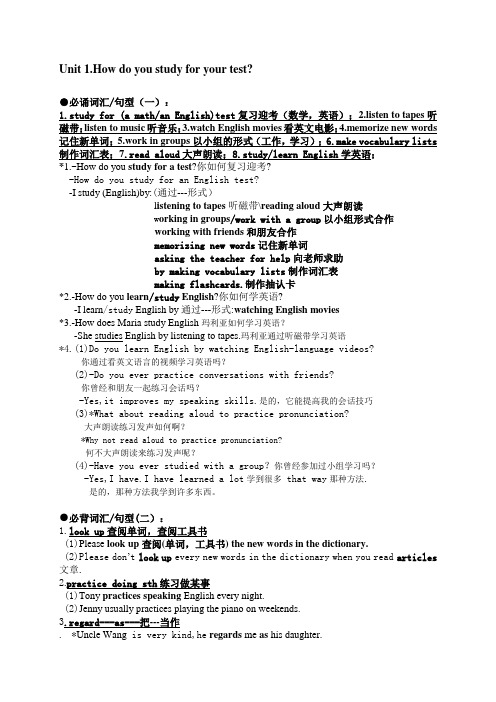
Unit 1.How do you study for your test?●必诵词汇/句型(一):1.study for (a math/an English)test复习迎考(数学,英语);2.listen to tapes听磁带;listen to music听音乐;3.watch English movies看英文电影;4.memorize new words 记住新单词;5.work in groups以小组的形式(工作,学习);6.make vocabulary lists 制作词汇表;7.read aloud大声朗读;8.study/learn English学英语;*1.-How do you study for a test?你如何复习迎考?-How do you study for an English test?-I study (English)by:(通过---形式)l istening to tapes听磁带\reading aloud大声朗读w orking in groups/work with a group以小组形式合作working with friends和朋友合作memorizing new words记住新单词asking the teacher for help向老师求助by making vocabulary lists制作词汇表making flashcards.制作抽认卡*2.-How do you learn/study English?你如何学英语?-I learn/study English by通过---形式:watching English movies*3.-How does Maria study English玛利亚如何学习英语?-She studies English by listening to tapes.玛利亚通过听磁带学习英语*4.(1)Do you learn English by watching English-language videos?你通过看英文语言的视频学习英语吗?(2)-Do you ever practice conversations with friends?你曾经和朋友一起练习会话吗?-Yes,it improves my speaking skills.是的,它能提高我的会话技巧(3)*What about reading aloud to practice pronunciation?大声朗读练习发声如何啊?*Why not read aloud to practice pronunciation?何不大声朗读来练习发声呢?(4)-Have you ever studied with a group?你曾经参加过小组学习吗?-Yes,I have.I have learned a lot学到很多 that way那种方法.是的,那种方法我学到许多东西。
人教版九年级全一册unit 1 1a~2d课件
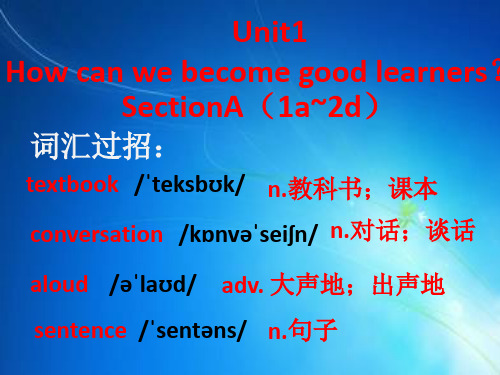
A.According B.by C.below
猜测单词by 的含义: I know the wordby looking up thedictionary.
1
2
通过1和2,可猜测by的含义: by:介词.通过…的方式.
知识巩固: 翻译下面的句子:
4.Sound听起来….. 后接形容词。和本词用法一致的还有:look、 feel、taste……. ( A )1. The red coat____beautiful.
A.looks B.feel C.sound
( B )2. Your idea_____good. A.look B.sounds C.sound
Unit1 How can we become good learners?
SectionA(1a~2d)
词汇过招:
textbook /ˈteksbʊk/ n.教科书;课本 conversation /kɒnvəˈseiʃn/ n.对话;谈话
aloud /əˈlaʊd/ adv. 大声地;出声地
sentence /ˈsentəns/ n.句子
11、越是没有本领的就越加自命不凡 。21.8.3 20:20:2 120:20 Aug-21 3-Aug-2 1 12、越是无能的人,越喜欢挑剔别人 的错儿 。20:20: 2120:2 0:2120: 20Tues day, August 03, 2021 13、知人者智,自知者明。胜人者有 力,自 胜者强 。21.8.3 21.8.32 0:20:21 20:20:2 1Augus t 3, 2021 14、意志坚强的人能把世界放在手中 像泥块 一样任 意揉捏 。2021 年8月3 日星期 二下午8 时20分 21秒20 :20:212 1.8.3 15、最具挑战性的挑战莫过于提升自 我。。2 021年8 月下午 8时20 分21.8.3 20:20A ugust 3, 2021 16、业余生活要有意义,不要越轨。2 021年8 月3日 星期二8 时20分 21秒20 :20:213 August 2021 17、一个人即使已登上顶峰,也仍要 自强不 息。下 午8时20 分21秒 下午8 时20分2 0:20:21 21.8.3
人教版英语九年级unit1知识点总结

人教版英语九年级unit1知识点总结人教版英语九年级Unit 1知识点总结Unit 1的主题是“Can you play the guitar?”,属于九年级英语课本的第一单元。
在这个单元中,我们学习了关于音乐和乐器的词汇、日常交流用语以及一些语法知识。
在接下来的文章中,我将对这些知识点进行总结和归纳。
一、词汇与短语在Unit 1中,我们学习了很多与音乐和乐器相关的词汇和短语。
例如,guitar(吉他)、piano(钢琴)、violin(小提琴)、drums (鼓)、saxophone(萨克斯管)等等。
通过学习这些词汇,我们可以更好地了解不同乐器的特点和功能,拓宽了我们的音乐知识面。
此外,我们还学习了一些动词短语,用于描述人们对音乐和乐器的喜好和能力。
例如,can play(会弹奏)、can’t play(不会弹奏)、like(喜欢)、love(喜爱)、listen to(听)、sing(唱)等等。
这些短语使我们能够在日常交流中更准确地表达自己对音乐的感受和态度。
二、日常交流用语在学习某个主题时,掌握相关的实用交流用语是非常重要的。
在Unit 1中,我们学习了一些常见的日常交流用语,用于询问他人的能力和喜好。
例如,Can you play the guitar?(你会弹吉他吗?)、What instruments can you play?(你会弹奏哪些乐器?)、What kind of music do you like?(你喜欢什么样的音乐?)等等。
这些句型能够帮助我们与他人进行交流,了解对方的兴趣爱好,并能够更好地建立沟通和交流的桥梁。
同时,通过这些日常交流用语的学习,我们也能提升自己的口语表达能力和应对能力。
三、语法知识在Unit 1中,我们学习了一些有关“can”的语法知识。
can意为“能够”,在句中用于表示某人的能力或询问对方是否有某种能力。
其一般疑问句形式为“Can + 主语 + 动词原形”,回答时可以用“Yes,I can.”或“No, I can't.”来回答。
九年级英语人教版全一册_Unit1_背诵默写版

Unit 1 How can we become good learners?Ⅰ. Phrases / 短语1. work with sb. 和某人一起学习2. make word cards 制作单词卡片3. listen to tapes 听磁带4. ask sb. for help 向某人求助5. study for a test 备考6. have conversations with 与……交谈7. read aloud 朗读8. speaking skills 口语技巧9. spoken English 英语口语10. a little=a bit=kind of 有点儿;稍微11. give a report 作报告12. at first 起初;起先(反:at last最后)13. word by word 一词一词地;逐词14. the secret to………的秘诀15. fall in love with 爱上……16. as well 也17. instead of 代替;反而18. so that 以便;为了19. the meaning of... ……的意思20. make mistakes=make a mistake 犯错误21. a lot of=lots of 许多22. be born with 天生具有23. the ability to do sth. 做某事的能力24. depend on 视……而定;依靠;依赖25. learning habits 学习习惯26. have…in common在……方面有共同点27. be interested in=take an interest in 对……感兴趣28. pay attention to 注意;关注29. worry about 担心;担忧30. for example 例如31. get bored 感到无聊/厌倦32. think about 思考;思索33. be good at=do well in 擅长34. even if 即使;虽然35. look for 寻找36. each other 彼此;互相37. find out 弄清;查明38. connect...with... 把……和……连接或联系起来39. look up 查阅;抬头看40. take notes 记笔记41. keep a diary 记日记42. by doing sth. 通过做某事finish doing sth. 做完某事practice doing sth. 练习做某事keep doing sth. 一直做某事43. begin to do sth. 开始做某事44. try to do sth. 尽力做某事try doing sth. 试着做某事need doing 需要被做……45.be afraid of doing sth. 害怕做某事be afraid to do sth. 不敢做某事46. What/How about doing sth.? 做某事怎么样?47. find it+ adj.+to do sth. 发现做某事是……的48. It is/was+ adj. +to do sth. 做某事是……的。
人教版九年级英语Unit1重点词汇和句型(教师版)

Unit11.conversation n.[C]. 交谈;谈话与某人交谈have conversations with sb.区别:communication:沟通,表达;通讯2.aloud adv.大声地;出声地loud adj. & adv.响亮地/ 响亮地loudly adv.响亮地(喧闹)3.pronounce v.发音,读音pronunciation n. [C, U]. 发音;读音4.patient n.[C]. 病人; adj.有耐心的反adj. impatient 没有耐心的patience n.耐心be patient with sb./sth. 对某人/某事有耐心5.expression n [C, U].表情;表示;表达方式express v. 表达,表示6.discover v.发现;发觉discovery n.发现,发现物7.look up (在词典、参考书中或通过电脑)查阅;抬头看look up to 仰慕look at 看......look for 寻找look after 照顾,照料look like 看起来像look through 浏览;快速查看look forward to 期盼,期待look out小心look out of向外看look over 仔细检查8.ability n.能力词根able adj.有能力的反义词:unable/disabled/disabilitybe able to/be unable to do sth. 能够/不能做某事9.create v.创造creation n.创造物creativity n.创造力creator n.创造者creative adj.有创造力的creatively adv.创造性地,有创造力地10.active adj.活跃的,积极的; 主动的拓展:actively adv.活跃地activity n.活动词根:act v. 表演; n. 行为,行动action n.行动actor n.男演员actress n.女演员11.connect v.使连接connection n.联系,关联connect …with… 把…和…连接起来12.knowledge n.知识knowledgeable adj. 知识渊博的13. pay attention to doing14. 用英语交谈have conversations with sb. in English15. 记英语单词memorize English words16. 擅长于be good at/ do well in17. 不擅长be weak in/ be poor in/at/ be bad at18. 在…上有困难have difficulty/ trouble in (doing)19. 养成大声阅读的习惯form the habit of reading aloud20. 在语法方面犯错make mistakes in grammar21. 练习说英语practice speaking English22. 害怕做某事be afraid of doing23. 相信自己believe in oneself24. 取得巨大进步make great progress25. 向某人寻求帮助ask sb. for help26. 小组学习study with a group27. 获得主旨get the main ideas28. 逐字逐句地word by word29. 意群word groups30. 用那种方式学到很多learn a lot that way31. 说的技能speaking skills32. 发现做…是…的find it +adj. + to do sth.33. 肢体语言body language34. 脸上的表情expressions on one’s faces35. 关键词key words36. 小菜一碟。
Unit1笔记人教版英语九年级全册
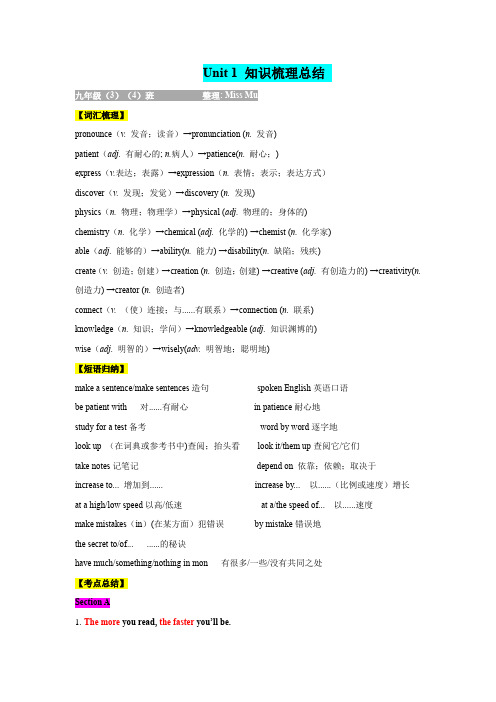
Unit 1 知识梳理总结34【词汇梳理】pronounce(v.发音;读音)→pronunciation (n. 发音)patient(adj.有耐心的; n.病人)→patience(n. 耐心;)express(v.表达;表露)→expression(n. 表情;表示;表达方式)discover(v.发现;发觉)→discovery (n. 发现)physics(n.物理;物理学)→physical (adj. 物理的;身体的)chemistry(n.化学)→chemical (adj. 化学的) →chemist (n. 化学家)able(adj.能够的)→ability(n. 能力) →disability(n. 缺陷;残疾)create(v.创造;创建)→creation (n. 创造;创建) →creative (adj. 有创造力的) →creativity(n. 创造力) →creator (n. 创造者)connect(v.(使)连接;与......有联系)→connection (n. 联系)knowledge(n.知识;学问)→knowledgeable (adj. 知识渊博的)wise(adj.明智的)→wisely(adv. 明智地;聪明地)【短语归纳】make a sentence/make sentences造句spoken English英语口语be patient with 对......有耐心in patience耐心地study for a test备考word by word逐字地look up (在词典或参考书中)查阅;抬头看look it/them up查阅它/它们take notes记笔记depend on 依靠;依赖;取决于increase to... 增加到...... increase by... 以......(比例或速度)增长at a high/low speed以高/低速at a/the speed of... 以......速度make mistakes(in)(在某方面)犯错误by mistake错误地the secret to/of... ......的秘诀have much/something/nothing in mon 有很多/一些/没有共同之处【考点总结】Section A1.The more you read, the faster you’ll be.①the+比较级(+主语+谓语),the+比较级(+主语+谓语)意为“越.......就越......”e.g. The more you eat, the heavier you will be.②比较级and 比较级more and more+原级(多音节词)e.g. It is getting colder and colder.Our country is getting stronger and stronger.Our hometown is being more and more famous.2.Why did Wei Fen find it difficult to learn English?find it(形式宾语)+adj.+to do sth. 发现做某事怎么样类似的结构还有:think/feel/make+it +adj. +to do sth.e.g. I think it necessary to tell her the truth.We find (主句)it is boring to listen to the speech(宾语从句).=We find it boring to listen to the speech.3.The teacher spoke so quickly that I didn’t understand her most of the time. so...that... 如此......以至于e.g. He ran so fast that nobody could catch up with him.I study hard so that I can find a good job.He is such a smart boy that we all like him.4.I was afraid to ask questions because of my poor pronunciation.①be afraid to do sth. 不敢做某事(=dare not to do)②be afraid of sth./sb. 害怕某物/某人③I am afraid that+从句恐怕......④I’m afraid so. 恐怕是这样。
人教版九年级英语Unit 1 (解析版)

Unit 1 How can we become good learners?一、课堂导入通过How do you…? By doing.这一句型来询问学生做事方式或让学生之间互相询问,预习本节课所需句型。
二、复习预习1. --____ do you know so much about the UFO?--I usually get the information by surfing the Internet.A. HowB. WhatC. WhichD. Where【答案】A【解析】本题考查对做事方式提问,用how。
所以答案为A。
2. Please remember that ____ careful we are, ____ mistakes we will make.A. the more, the fewerB. the fewer, the moreC. the more, the moreD. the less, the fewer 【解析】A【答案】本题考察形容词比较级常用句型the 比较级……,the 比较级……“越……越……”,careful的比较级是more careful,mistakes是可数复数前用more或fewer,根据句意选A。
3. --Tommy, you can never let others know what I have told you today.--Don’t worry. I will keep the ____ .A. secretB. moneyC. addressD. grade【解析】A【答案】本题考察名词词义辨析,根据句意:我会保守秘密,故选A。
4. My mother is ____ with me, though I make many mistakes every day.A. aloudB. secretC. patientD. too【答案】C【解析】本题考察形容词辨析,根据句意:我妈妈对我很耐心。
人教版九年级全册Unit1单词+短语+句子默写(含答案)
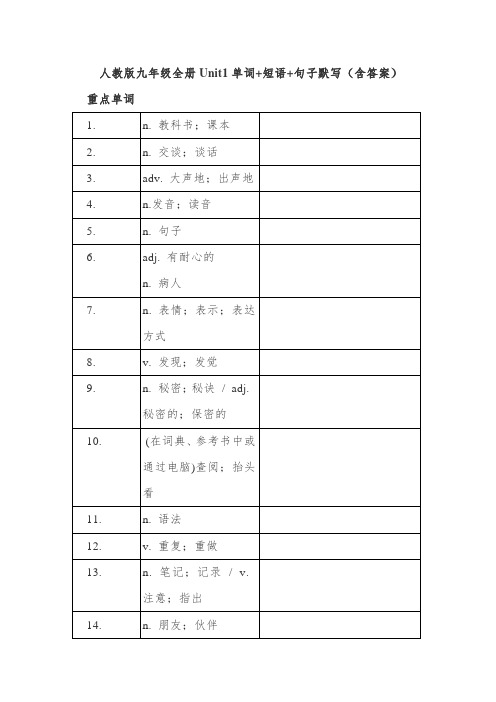
9.think about what they are good at
练习他们已学过的知识
10.practice what they have learned
复习他们已学过的知识
11.review what they have learned
19.
v.发音
pronounce /prə'naʊns/
20.
v.增加;增长
increase /In'kri:s/
21.
/n.速度
speed /spi:d
22.
n.搭档;同伴
partner /'pa:(r)tnə(r)/
23.
v.出生adj.天生的
born /bɔ:(r)n/
24.
天生具有
be born with
25.
n.能力;才能
ability /ə'bɪləti/
26.
v.创造;创建
create /kri'eɪt/
27.
n.大脑
brain /breɪn/
28.
adj.活跃的;积极的
active /'æktɪv/
29.
n.注意;关注
attention /ə'tenʃn/
30.
注意;关注
pay attention to
26.
v.创造;创建
27.
n.大脑
28.
adj.活跃的;积极的
29.
n.注意;关注
30.
注意;关注
31.
v.(使)连接;与……有联系
32.
把……和……连接或联系起来
33.
初中英语人教版九年级Unit 1单元知识清单 +习题
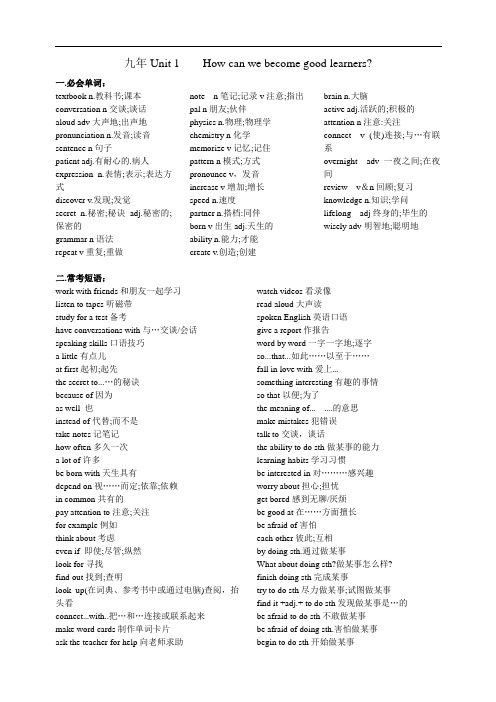
九年Unit 1 How can we become good learners?一.必会单词:textbook n.教科书;课本conversation n交谈;谈话aloud adv大声地;出声地pronunciation n.发音;读音sentence n句子patient adj.有耐心的.病人expression n.表情;表示;表达方式discover v.发现;发觉secret n.秘密;秘诀adj.秘密的;保密的grammar n语法repeat v重复;重做note n笔记;记录v注意;指出pal n朋友;伙伴physics n.物理;物理学chemistry n化学memorize v记忆;记住pattern n模式;方式pronounce v,发音increase v增加;增长speed n.速度partner n.搭档:同伴born v出生adj.天生的ability n.能力;才能create v.创造;创建brain n.大脑active adj.活跃的;积极的attention n注意:关注connect v (使)连接;与…有联系overnight adv一夜之间;在夜间review v&n回顾;复习knowledge n.知识;学问lifelong adj终身的;毕生的wisely adv明智地;聪明地二.常考短语:work with friends和朋友一起学习listen to tapes听磁带study for a test备考have conversations with与…交谈/会话speaking skills口语技巧a little有点儿at first起初;起先the secret to...…的秘诀because of因为as well 也instead of代替;而不是take notes记笔记how often多久一次a lot of许多be born with天生具有depend on视……而定;依靠;依赖in common共有的pay attention to注意;关注for example例如think about考虑even if 即使;尽管;纵然look for寻找find out找到;查明look up(在词典、参考书中或通过电脑)查阅,抬头看connect…with..把…和…连接或联系起来make word cards制作单词卡片ask the teacher for help向老师求助watch videos看录像read aloud大声读spoken English英语口语give a report作报告word by word一字一字地;逐字so...that...如此……以至于……fall in love with爱上…something interesting有趣的事情so that以便;为了the meaning of…….的意思make mistakes犯错误talk to交谈,谈话the ability to do sth做某事的能力learning habits学习习惯be interested in对………感兴趣worry about担心;担忧get bored感到无聊/厌烦be good at在……方面擅长be afraid of害怕each other彼此;互相by doing sth.通过做某事What about doing sth?做某事怎么样? finish doing sth完成某事try to do sth尽力做某事;试图做某事find it +adj.+ to do sth发现做某事是…的be afraid to do sth不敢做某事be afraid of doing sth.害怕做某事begin to do sth开始做某事help sb.(to)do sth帮助某人做某事want to do sth想(要)做某事practice doing sth练习做某事need to do sth需要做某事keep doing sth一直做某事remember to do sth记得做某事It +be+ adj.+ to do sth做某事是……的。
人教版英语九年级Unit1知识点归纳

人教版英语九年级Unit1知识点归纳Unit 1: FriendsIn the ninth-grade English textbook, the first unit titled "Friends" introduces students to various topics related to friendship. This unit plays a vital role in not only enhancing language proficiency but also shaping students' understanding of what constitutes a good friend. Let's delve into the key concepts discussed in this unit without further ado.1. Friendship and Its ImportanceFriendship is a fundamental aspect of our lives that brings us joy, support, and companionship. True friends are those who stand by us through thick and thin, offering comfort, advice, and understanding. They are the ones we can trust and rely on. Friendships contribute to happiness, personal growth, and overall well-being, making them essential for a fulfilling life.2. Types of FriendshipUnit 1 explores different types of friendships students may encounter, such as childhood friends, school friends, and online friends. Each type of friendship has its unique characteristics and dynamics. Childhood friends provide a sense of familiarity and shared memories,while school friends offer companionship during the academic journey. Online friends, enabled by technology, provide opportunities for cross-cultural connections and support networks.3. Maintaining Healthy FriendshipsBuilding and maintaining healthy friendships require effort from both parties involved. Communication, trust, mutual respect, and understanding are vital components to foster healthy friendships. It involves active listening, empathy, and compromise. Respect for each other's boundaries and being there for one another during challenging times are crucial elements in maintaining strong connections.4. Conflict ResolutionConflicts are inevitable in any relationship, including friendships. Recognizing and addressing conflicts in a constructive manner is essential for the longevity of a friendship. The unit provides strategies for conflict resolution, such as open and honest communication, active listening, and finding common ground. Resolving conflicts helps strengthen friendships and deepens mutual understanding.5. Cultural Differences in FriendshipThis unit also touches upon the cultural aspects of friendship. Friendships vary across different cultures, influenced by societal norms, values, and traditions. Understanding and appreciating cultural differences contribute to a more inclusive and respectful approach towards friendship. Such knowledge expands students' worldview and cultivates their ability to establish meaningful connections with people from diverse backgrounds.6. Friendship in LiteratureLiterature often explores the theme of friendship, offering valuable insights into human relationships and the challenges encountered within them. The unit introduces students to literary works that depict friendship's complexities, such as "Of Mice and Men" by John Steinbeck and "The Kite Runner" by Khaled Hosseini. Through analyzing these literary works, students gain a deeper understanding of friendship and its impact on individuals' lives.In conclusion, Unit 1 of the ninth-grade English textbook dives into the multifaceted nature of friendship. By exploring different aspects of friendship, from its importance to maintaining healthy relationships, cultural differences, and its portrayal in literature, students gain invaluable insights into building and nurturing meaningful connections. This unit serves as a foundation for students to develop stronginterpersonal skills and cultivate lasting friendships throughout their lives.。
- 1、下载文档前请自行甄别文档内容的完整性,平台不提供额外的编辑、内容补充、找答案等附加服务。
- 2、"仅部分预览"的文档,不可在线预览部分如存在完整性等问题,可反馈申请退款(可完整预览的文档不适用该条件!)。
- 3、如文档侵犯您的权益,请联系客服反馈,我们会尽快为您处理(人工客服工作时间:9:00-18:30)。
Unit 1姓名________ 学号________ 班级________ 得分________一、听力理解(略)二、单项选择(每小题1分,共15分)( )31. — In my opinion, reading aloud is one of _________ best ways to learn English.— I agree with you.A. aB. anC. /D. the( )32. — Is this your dictionary?—No, it’s not ________. It’s ________.A. mine; LilyB. mine; Lily’sC. me; LilyD. me; Lily’s( )33. — You should be ________. Improving your English needs time.— OK, Mr. Smith. A. lazy B. careful C. patient D. active( )34. — We often learn English words __________ making word cards.— That’s a good way.A. byB. withC. asD. of( )35. — He has the __________ to be a good teacher.— I think so.A. activityB. answerC. adviceD. ability( )36. — ________ does your father go to work?—He usually takes the subway.A. WhatB. HowC. WhenD. Where( )37. — Must I finish the homework today?—No, you ________.A. needn’tB. mustn’tC. shouldn’tD. can’t( )38. — Will you come to Julia’s party?—No, _______ we’re going to New York City this weekend.A. untilB. soC. becauseD. because of( )39. —Sorry, we can’t hear you clearly. Could you please ________ your e-mail address? —I’ll write it down.A. reviewB. repeatC. pronounceD. connect( )40. —What do you think of Mark’s spoken English?—No one in our class does ________ than him.A. wellB. the bestC. bestD. better( )41. — He ________ in this factory for 15 years already.— When did he begin to work there?A. has workedB. worksC. is workingD. will work( )42. — It _________ me the whole day to finish reading the novel yesterday.— Really? You must like it very much.A. paidB. spentC. tookD. cost( )43. —If you meet some new words, you’d better ______ in a dictionary.— Thank you.A. look up themB. look them upC. look out themD. look them out ( )44. — What can I do on weekends?— You can join a chess club to practice ___________ chess.A. playB. playedC. to playD. playing( )45. —Why don’t you join an English language club?—________.A. That’s a good ideaB. That’s all rightC. I am sorry to hear thatD. It doesn’t matter三、完形填空(每小题1分,共10分)Jake and Amy were in the same first grade class. They took a math test that morning, and Jake didn’t do very well. They were walking home from school with Jake’s big brother Ben. “What’s wrong, Jake?” Ben asked.“46 ,” Jake said. “It’s too hard to add big numb ers.”“I can 47 you,” Ben said. “Hold up your48 . And now tell me how 49 fingers you have.”“That’s easy. I have ten fingers,” Jake said.“Now take away your fingers, 50 remember you had ten. Try to add nine more,” Ben said.“But I don’t know how!” Jake cried out.“Hold up nine fingers,” Ben said. “Now, you 51 had ten. What 52 comes after ten?”“Eleven,” said Jake.“This finger is eleven. What’s the next finger?” Ben asked.“Twelve,” Jake said. Ben 53 each of the fingers Jake wa s holding up. “Thirteen, fourteen, fifteen, sixteen, seventeen, eighteen, nineteen! Ten plus nine is nineteen!” Ben said with a big smile.“I get it!” said Jake. “54 what happens when we have to add even bigger numbers? I only have ten fingers!”“I know!” Amy said, sitting down and 55 her shoes. “We can use our toes!”( )46. A. Physics B. History C. Math D. English( )47. A. find B. help C. lend D. call( )48. A. hands B. coats C. books D. legs( )49. A. far B. long C. many D. much( )50. A. if B. but C. so D. or( )51. A. only B. still C. also D. already( )52. A. number B. name C. color D. day( )53. A. learnt B. kept C. touched D. drew( )54. A. If B. But C. So D. Or( )55. A. taking off B. putting on C. finding out D. looking up四、阅读理解(一) (每小题2分,共30分)ASome books have a list of words called a glossary at the back. A glossary tells you what words mean, like a little dictionary. Read this glossary from a book about plants.( )56. What is a glossary?A. A list of words.B. A list of book names.C. Some addresses.D. Some telephone numbers.( )57. What part of a plant is in the soil?A. Leaf.B. Stem.C. Root.D. Flower.( )58. How many things mentioned above can help plants grow?A. One.B. Two.C. Four.D. Five.( )59. What is a seedling?A. It is the main part of a plant.B. It is a part of a plant that grows on the stem.C. It is a part of a plant where new seeds grow.D. It is a young plant.( )60. You should know these words if you want to learn ________.A. plantsB. animalsC. chemistryD. physicsBMark frowned (皱眉头). His sister Trina was getting a lot of gifts for her first birthday. She had lots of attention. Grandparents were here for the party.What about him? No one cared what he was doing. Fine! He thought. If no one cares, then I can do what I want. He got up and broke a balloon (气球) with a fork (叉子). POP!“Mark, stop that,” Mom said quickly.Grandpa took him to the kitchen. “Sit down,” he said.Mark sat down and crossed his arms.“It’s a big responsibility (责任) having a baby sister,”Grandpa said.“Not really. She cries, and plays.”Grandpa smiled, “That’s not what I mean. I mean it’s hard to share with your little sister when you used to be th e only child at home.”Mark looked at him, “I don’t see why she’s so special. What about me?”“You had your time, Mark. There was no one to share with. You were lucky. Your sister has to share your parents with you, so you have to share your parents with h er. You’re also older, so you’ll have to be a big boy.”“OK,” Mark said. Then they went back to the party, and there were no more balloons getting popped. Mark actually had some fun, too.( )61. Whose birthday party was this?A. Grandpa’s.B. Mom’s.C. Mark’s.D. Trina’s.( )62. Why did Mark break a balloon?A. He wanted others to care about him.B. He wanted to buy a new balloon.C. He wanted his sister to play with him.D. He wanted to play games with his grandpa.( )63. What is the relationship between Mark and Trina?A. Mother and son.B. Teacher and student.C. Brother and sister.D. Friends.( )64. What did Mark’s grandfather say?A. Mark’s sister should look after Mark.B. Mark should learn how to share his parents with his sister.C. Mark’s parents should have a new baby.D. Mark’s sister is a very special child.( )65. How did Mark feel at the end of the story?A. BoredB. Nervous.C. Sad.D. Happy.CThere are many things you can do to improve your English. One of the best things to do, however, is to read, write and speak English as much as possible. The more you practice your English, the more likely you are to improve it.Take a ClassEnglish classes are available (可获得的) through schools or other education programs in many parts of the world. No matter where the class is offered, it is best if it is taught by a person whose first language is English. Some classes might focus on reading, writing or speaking, but others will teach students in all three areas.Use English DailyIf you are living in an English-speaking country, you have many chances to improve your English outside of class. For example, if you have children who are learning English at school, you can improve your English by talking to them in English and helping them with their English homework.One Word at a TimeIf you want to improve your English vocabulary, it can be helpful to learn a few new words at a time. For example, you could learn one new word every few days and look for chances to usethem in conversation. Another way is to learn two or three new words each week and spend the week trying to use them.( )66. The author may agree that ________.A. young people are good at learning different languagesB. students shouldn’t take part in some English classesC. students should speak English as much as possibleD. English is more difficult to learn than other languages( )67. What’s the meaning of the underlined word “focus” in Chinese?A.关注B. 选择C. 无视D. 关心( )68. How to use English daily according to the passage?A. By finding a good English teacher.B. By talking with other people in English.C. By learning some new words every day.D. By doing some grammar practices.( )69. After students learn some new words, they ________.A. can try to guess their meaningsB. don’t need to remember their meaningsC. must look up their meanings in the dictionaryD. should use these new words as much as possible in conversation( )70. What is the passage mainly about?A. How to improve your English.B. Learning English online.C. How to remember new words.D. Using English daily.五、单词拼写根据句子意思和所给的单词首字母或中文提示,填入一个正确的词。
